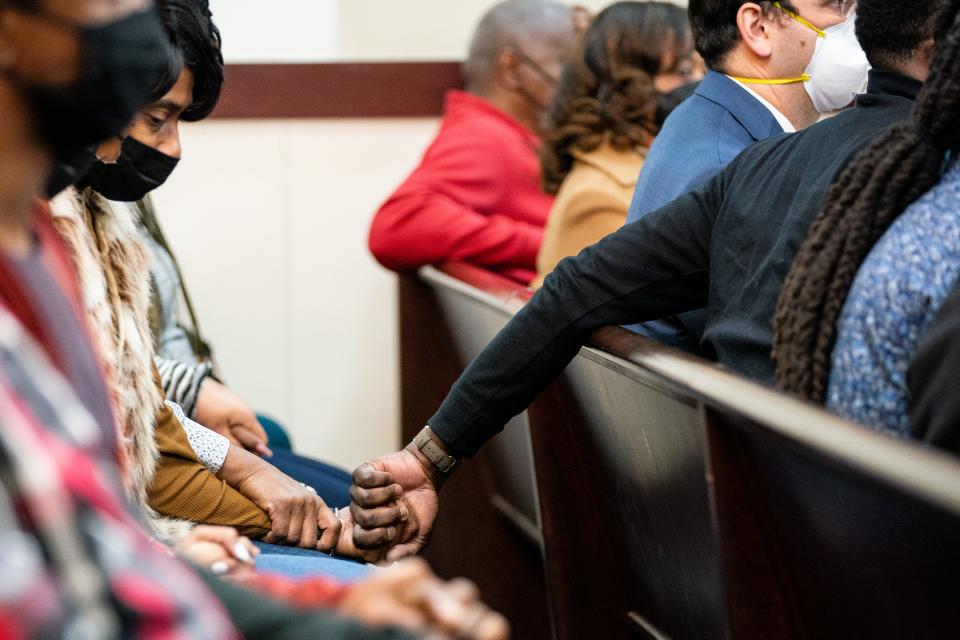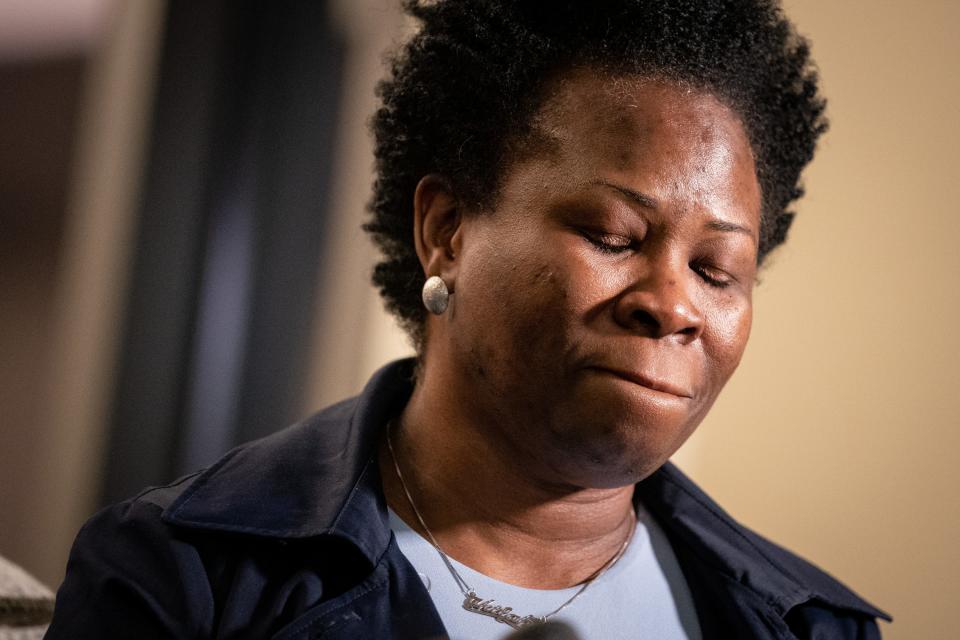'This has broken me': Travis Reinking sentenced to four life sentences in Waffle House shooting
Travis Reinking, convicted in the 2018 Waffle House mass shooting, will spend the rest of his life in prison, a Nashville jury decided Saturday.
Reinking was found guilty Friday of multiple first-degree murder charges and four felony murder charges, which will combine for the sentence.
The jury sentenced him to life in prison without the possibility of parole on all four.
He faced 16 counts in total and was found guilty on all charges. Sentencing in the remaining charges will be handled later by the court.
Davidson County Criminal Court Judge Mark Fishburn will decide later whether the sentences will run concurrently or consecutively, likely in early May.
2018 mass shooting killed four
It was their chance to tell him how he hurt them.
Patricia Perez, mother of Joe Perez Jr., went first.
In a quavering voice, she talked about her Joey.
He would have ben 24 this year. Her youngest, her baby.
But in 2018, he was killed in a mass shooting outside an Antioch Waffle House by Travis Reinking, who wielded a semiautomatic rifle in the middle of the night.
Reinking, 33, was found guilty in Davidson County Criminal Court on Friday of 16 charges, including four counts of first-degree murder. The verdict thwarted an attempted insanity plea from his defense attorneys.
Joe R. Perez Jr., 20; Taurean C. Sanderlin, 29; DeEbony Groves, 21; and Akilah DaSilva, 23, died after Reinking walked into the restaurant just after 3:20 a.m. and opened fire with an AR-15 semi-automatic rifle. Three others, James Shaw Jr., Kayla Shaw, Sharita Henderson and Shantia Waggoner, were wounded in the shooting.
Loved ones of the people who were shot testified Saturday as a jury and judge considered Reinking's sentencing.
The question was passed to the jury just after noon Saturday to deliberate, they returned less than two hours later. The jury foreperson announced the sentences in confident tones.

'This has broken me'
"I've always been somebody they say is unbreakable," Patricia Perez said in a quavering voice. "This has broken me. Not just my spirit, not just my family, but also my mind.
"I wake up every day with just a little bit of hope that everything that has happened was a dream. That I'll wake up and everything will be fine, but it isn't. And he truly is gone."
One by one - two people allowed to speak for each victim - they took the stand in tearful, angry, mournful testimony.
Blanche Anderson, Sanderlin's aunt, testified on behalf of his parents, Wanda and Charles Sanderlin.
"They're both too overwhelmed to speak, so they asked me to do it," she said. "I'm doing my best."
She hasn't slept right in four years, she said. She dreams of Taurean and wakes up crying.
His parents will never be the same, either. Wanda Sanderlin is afraid of everything. Charles Sanderlin is drinking more.
Taurean Sanderlin's cousin William Bryson Murray said he felt his loss daily. The pair were best friends all their lives, as close as brothers.
When he heard about the shooting, he tried to reach Sanderlin. He knew his family members were calling hospitals.
He drove to the Waffle House, just down the street. He went through the yellow police tape.
He saw a body on the ground.
He saw Sanderlin's body on the ground.
'My baby is gone'
Shaundelle Brooks wore blue every day of the trial. Saturday was no exception.
Blue was her son's favorite color. Two of her sons, Akilah and Abeda DaSilva, were at the Waffle House that night with their girlfriends, celebrating the creation of a successful music video.
Akilah never came home.

Brooks took the stand Saturday morning to read a prepared statement. She spoke through wrenching sobs as she remembered his childhood, his talent, his future that will never be.
"Every morning, I wake up with the same thought: My baby is gone," she read. "Every morning I feel that unbearable sense of loss and sorrow. The pain is so great that some days I'm not sure I can even open my eyes."
Brooks said when she heard from Abede she drove frantically to the hospital.
She arrived just as the ambulance carrying Akilah arrived.
She recognized his shoes.
She called his name three times.
He didn't answer.
"I want to prevent every mother from experiencing what I did ... to know she will grow old without her beloved child," she said.
Abede DaSilva relives it every day. He relives the shooting. He relives seeing the pain in his dying brother's eyes. He relives knowing he's alive while his brother is not.
"It hurts to know that he died and I didn't," he says. "There's nothing that can fill that void. It scares me.
"Every day is a fight."
'She should be here."
DeEbony Groves' brother Di'Angelo used to mark down on a calendar each day his mother cried after the shooting.
"I remember feeling helpless because there was nothing I could do," he said through sobs. "Her grief is her grief and my grief is my grief and I will never understand."
DeEbony and De'Angelo were inseparable, close in age and both students at Belmont University.
Albert Groves, her father, said she was born on Father's Day, 1996.
"I got a double blessing that day," he said.
He still uses a lunchbox with her initials, DLG, on it.
They joked that it stood for "Daddy's little girl."
"She was just like me," he said.
Shirl Baker Groves spoke softly and slowly on the stand. She chose her words with intention.
"My days now are spent with scheduled weekly visits to the cemetery," she said. She passes it on her way to church.
"A broken heart and a hole in my soul," she said.
Brother watches sentencing
Reinking's 13-year-old brother attended the sentencing hearing Saturday.
His mother, Judy Reinking, told The Tennessean this week she hoped he'd be able to come. He and his brother have always been close, she said, and he wanted to be there to support him.
But storms in the Midwest delayed his visit until Saturday.
He sat with his parents in the front row of the gallery. When he arrived, Reinking's face lit up in a smile as he waved at his brother, one of the most animated reactions he's shown all week.
Judy Reinking wished she could turn back time.
“I want him with me,” she said Thursday afternoon before the trial was complete. “My hope’s beyond probably any outcome.”
She wished she could turn back time. She wished she could have her son home with her. She wished the families of victims in the Waffle House shooting knew none of this pain.
She wished she had been able to help her son before it came to this.
“It’s so hard to learn how much he was hurting when we didn’t know,” she said Thursday. “It’s so hard to know all of this.”
Life without parole in Tennessee
The state ruled out seeking the death penalty for Reinking more than two years ago, but asked the jury for life sentences without the possibility of parole on the first-degree murder convictions. Reinking's defense wanted jurors to give him the possibility of release.
"It is not one life lost, it was four. And this man intended to take so much more," Assistant District Attorney Jan Norman said during closing rebuttal arguments. "He went there to murder every single person in that building."
The state argued there were two aggravating factors to lead the jury to choose life without parole. The defense argued there were five mitigating factors against.
Defense attorney Luke Evans and Deputy District Attorney Roger Moore both reminded the jury there was no magic number to balance those factors. It was up to the jurors to decide how heavily to weigh them.
"As much as your hearts go out to the victims, nothing you do today is going to make them whole," he said. "It's not your job to make them whole. You can't.
"Law and justice requires you to consider the mitigating circumstances. Justice demands it."
No one disputes that Reinking is severely mentally ill. Evans reminded jurors they were allowed to consider that in their sentencing decision even though they did not find it persuasive in their verdict.
"No one's asking you to forgive him. No one's asking you to excuse him," Evans said.
But the state asked them to weigh heavily the deaths of the victims.
"There is a value to life that Travis Reinking did not apply, did not consider," Moore said. "Those lives can't be brought back. Their memories will be cherished, no doubt, by everyone who knew them. I daresay they will live in your memory, as well."
Insanity defense: 'I don’t know if I’m delusional or not': Psychologist testifies Reinking has schizophrenia
Waffle House shooting trial, day 4: DA reveals haunting jailhouse drawings by suspect
A 1995 state law prohibits inmates sentenced to life in prison from having a parole eligibility hearing until after they have served 51 years.
Efforts to revise parole eligibility are ongoing after the state Senate in 2021 passed a revision to reduce the minimum time served to 25 years, but have stalled in the House.
Potential release on parole is a decision that must be made in each case by the state Board of Parole, which frequently denies inmates release until after multiple hearings.
The proposed reform is not a new idea, but rather the same life-sentence parole eligibility timeline in place in Tennessee until the mid-1990s.
204 years
Sentencing on the other charges will be handled at a later date by Fishburn.
Fishburn will also determine whether Reinking's sentences should run consecutively or concurrently, based on statutory factors that guide his decision.
Those factors can prompt Fishburn to set them consecutively if the defendant has a lengthy criminal history, the charges involved sex crimes and other factors.
Longtime Nashville defense attorney David Raybin told The Tennessean he expects Fishburn to most strongly consider the fourth factor in the list.
The fourth factor says "the defendant is a dangerous offender whose behavior indicates little or no regard for human life, and no hesitation about committing a crime in which the risk to human life is high."
"For the jury to sentence to life without parole, the jury must find beyond a reasonable doubt one or more statutory aggravating factors," Raybin said in an email, referencing both the mass murder element and the threat of death to more than two people.
The second, he says, is not uncommon.
"But that mass murder provision is very uncommon and is why the case is as serious as it is," he wrote.
The possible mitigating factor of Reinking's mental illness was also clearly present in this case, he said.
Like the conviction, the sentence can be taken up on appeal.
Lawyers for both sides have been silent on this case for years under a court-issued gag order. As of Saturday afternoon, they all continued to decline to comment.
Reach reporter Mariah Timms at mtimms@tennessean.com or 615-259-8344 and on Twitter @MariahTimms.
This article originally appeared on Nashville Tennessean: Waffle House shooting victims' families testify in Reinking sentencing
